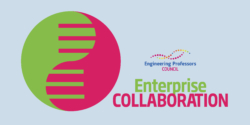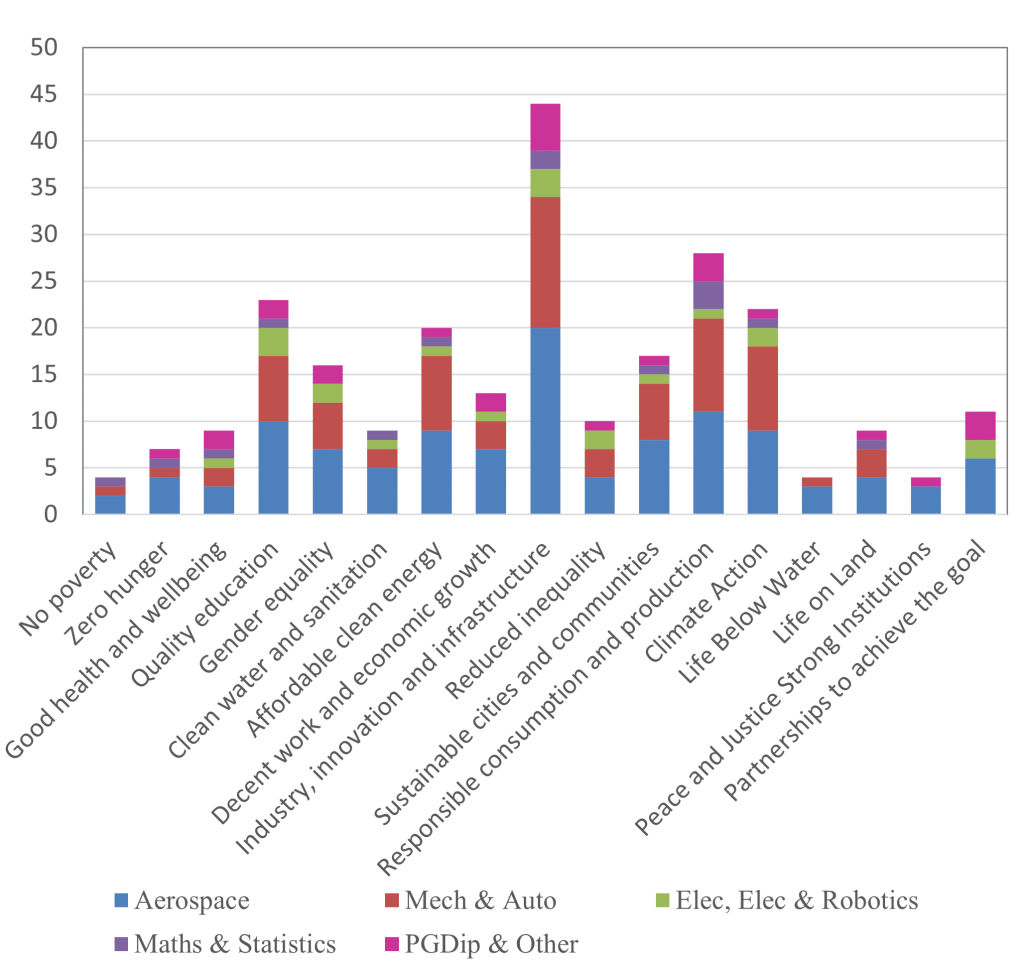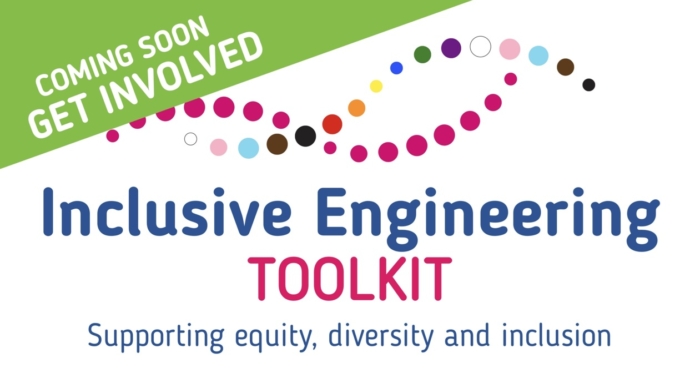 Theme: Universities’ and businesses’ shared role in regional development.
Theme: Universities’ and businesses’ shared role in regional development.
Author: Dr Laura Fogg-Rogers (University of the West of England, Bristol).
Case-study team: Wendy Fowles-Sweet; Maryam Lamere; Prof. Lisa Brodie; Dr Venkat Bakthavatchaalam (University of the West of England, Bristol); Dr Abel Nyamapfene (University College London).
Keywords: Education for Sustainable Development; Climate Emergency; Net Zero; Sustainable Development Goals.
Abstract: The University of the West of England (UWE Bristol) has declared a Climate and Ecological Emergency, along with all regional councils in the West of England. In order to meet the regional goal of Net-Zero by 2030, sustainability education has now been embedded through all levels of the Engineering Curriculum. Current modules incorporate education for Sustainable Development Goals alongside citizen engagement challenges, where engineers find solutions to real-life problems. All undergraduate engineers also take part in immersive project weeks to develop problem-based learning around the Engineers without Borders international challenges.
Engineering Education for Sustainable Development
The environmental and health impacts of climate change and biodiversity loss are being felt around the world, from record high temperatures, drought, wildfires, extreme flooding, and human health issues (Ripple et al., 2020). The Intergovernmental Panel on Climate Change reports that urgent action is required to mitigate catastrophic impacts for billions of people globally (IPCC, 2022). The UK Government has pledged to reach net zero emissions by 2050, with a 78% drop in emissions by 2035 (UK Government, 2021). Following IPCC guidance, regional councils such as Bristol City Council and the West of England Combined Authority, have pledged to reach Net Zero at an earlier date of 2030 (Bristol City Council, 2019). In parallel, UWE Bristol has embedded this target within its strategic plan (UWE Bristol, 2019), and also leads the Environmental Association for Universities and Colleges (EAUC), an Alliance for Sustainability Leadership in Education (UWE Bristol, 2021b). All UWE Bristol programmes are expected to embed the UN Sustainable Development Goals (SDGs) within curricula (UN Department of Economic and Social Affairs, 2021), so that higher education degrees prepare graduates for working sustainably (Gough, 2021).
Bourn and Neal (2008) draw the link between global sustainability issues and engineering, with the potential to tackle complex sustainability challenges such as climate change, resource limitations, and extreme poverty. The SDGs are therefore particularly relevant to engineers, showing the connections between social, environmental, and economic actions needed to ensure humanitarian development, whilst also staying within planetary boundaries to support life on earth (Ramirez-Mendoza et al., 2020). The engineering sector is thus obligated to achieve global emissions targets, with the work of engineers being essential to enable the societal and technological change to reach net zero carbon emissions (Fogg-Rogers, L., Richardson, D., Bakthavatchaalam, V., Yeomans et al., 2021).
Systems thinking and solution-finding are critical engineering habits of mind (Lucas et al., 2014), and so introducing genuine sustainability problems provides a solid foregrounding for Education for Sustainable Development (ESD) in engineering. Indeed, consideration for the environment, health, safety, and social wellbeing are enshrined in the UK Specification for Professional Engineers (UK SPEC) (Engineering Council, 2021). ‘Real-world’ problems can therefore inspire and motivate learners (Loyens et al., 2015), while the use of group projects is considered to facilitate collaborative learning (Kokotsaki et al., 2016). This aligns with recommendations for creating sustainability-literate graduates published by the Higher Education Academy (HEA) and the UK Quality Assurance Agency for Higher Education (QAA and Advance HE, 2021) which emphasise the need for graduates to: (1) understand what the concept of environmental stewardship means for their discipline and their professional and personal lives; (2) think about issues of social justice, ethics and wellbeing, and how these relate to ecological and economic factors; and (3) develop a future-facing outlook by learning to think about the consequences of actions, and how systems and societies can be adapted to ensure sustainable futures (QAA & HEA, 2014). These competencies are difficult to teach, and instead need to developed by the learners themselves based on experience and reflection, through a student-centred, interdisciplinary, team-teaching design (Lamere et al., 2021).
The need for engineers to learn about the SDGs and a zero carbon future is therefore necessary and urgent, to ensure that graduates are equipped with the skills needed to address the complex challenges facing the 21st Century. Lamere et al., (2021)describe how the introduction of sustainability education within the engineering curriculum is typically initiated by individual academics (early adopters) introducing elements of sustainability content within their own course modules. Full curricula refresh in the UWE Bristol engineering curricula from 2018-2020 enabled a more programmatic approach, with inter-module connections being developed, alongside inter-year progression of topics and skills.
This case study explores how UWE Bristol achieved this curriculum change throughout all programmes and created inter-connected project weeks in partnership with regional stakeholders and industry.
Case Study Methods – Embedding education for sustainable development
The first stage of the curricula transformation was to assess current modules against UK SPEC professional requirements, alongside SDG relevant topics. A departmental-wide mixed methods survey was designed to assess which SDGs were already incorporated, and which teaching methods were being utilized. The survey was emailed out to all staff in 2020, with 27 module leaders responding to highlight pedagogy in 60 modules, covering the engineering topics of: Aerospace; Mechanical and Automotive; Electrical, Electronic, and Robotics; Maths and Statistics; and Engineering Competency.
Two sub-themes were identified: ‘Direct’ and ‘Indirect’ embedding of SDGs; direct being where the engineering designs explicitly reference the SDGs as providing social or environmental solutions, and indirect being where the SDGs are achieved through engineering education e.g. quality education and gender equality. Direct inclusion of the SDGs tended to focus on reducing energy consumption, and reducing weight and waste, such as through improving the efficiency of the machines/designs. Mitigating the impact of climate change through optimal use of energy was also mentioned. The usage of lifecycle analysis was implemented in several courses, especially for composite materials and their recycling. The full analysis of the spread of the SDGs and their incorporation within different degree programmes can seen in Figure 1.

Figure 1 Number of Engineering Modules in which SDGs are Embedded
Project-based learning for civic engagement in engineering
Following this mapping process, the modules were reorganized to produce a holistic development of knowledge and skills across programmes, starting from the first year to the final year of the degree programmes. This Integrated Learning Framework was approved by relevant Professional Bodies and has been rolled out annually since 2020, as new learners enter the refreshed degree programmes at UWE Bristol. The core modules covering SDG concepts explicitly are Engineering Practice 1 and 2 (at Level 1 and 2 of the undergraduate degree programme) and ‘Engineering for Society’ (at Level 3 of the undergraduate degree programme and Masters Level). These modules utilise civic engagement with real-world industry problems, and service learning through engagement with industry, schools, and community groups (Fogg-Rogers et al., 2017).
As well as the module redevelopment, a Project-Based Learning approach has been adopted at department level, with the introduction of dedicated Project Weeks to enable cross-curricula and collaborative working. The Project Weeks draw on the Engineering for People Design Challenge (Engineers without Borders, 2021), which present global scenarios to provide university students with “the opportunity to learn and practice the ethical, environmental, social and cultural aspects of engineering design”. Critically, the challenges encourage universities to develop partnerships with regional stakeholders and industry, to provide more context for real-world problems and to enable local service learning and community action (Fogg-Rogers et al., 2017).
A collaboration with the innovation company NewIcon enabled the development of a ‘design thinking’ booklet which guides students through the design cycle, in order to develop solutions for the Project Week scenarios (UWE Bristol, 2021a). Furthermore, a partnership with the initiative for Digital Engineering Technology and Innovation (DETI) has enabled students to take part in the Inspire outreach programme (Fogg-Rogers & Laggan, 2022), which brings together STEM Ambassadors and schools to learn about engineering through sustainability focussed activities. The DETI programme is delivered by the National Composites Centre, Centre for Modelling and Simulation, Digital Catapult, UWE Bristol, University of Bristol, and University of Bath, with further industry partners including Airbus, GKN Aerospace, Rolls-Royce, and Siemens (DETI, 2021). Industry speakers have contributed to lectures, and regional examples of current real-world problems have been incorporated into assignments and reports, touching on a wide range of sustainability and ethical issues.
Reflections and recommendations for future engineering sustainability education
Students have been surveyed through module feedback surveys, and the project-based learning approach is viewed very positively. Students commented that they enjoyed working on ‘real-world projects’ where they can make a difference locally or globally. However, findings from surveys indicate that students were more inclined towards sustainability topics that were relevant to their subject discipline. For instance, Aerospace Engineering students tended to prefer topics relevant to Aerospace Engineering. A survey of USA engineering students by Wilson (2019) also indicates a link between students’ study discipline and their predilection for certain sustainability topics. This suggests that for sustainability education to be effective, the content coverage should be aligned, or better still, integrated, with the topics that form part of the students’ disciplinary studies.
The integration of sustainable development throughout the curricula has been supported at institutional level, and this has been critical for the widescale roll out. An institution-wide Knowledge Exchange for Sustainability Education (KESE) was created to support staff by providing a platform of knowledge sharing. Within the department, Staff Away days were used to hold sustainability workshops for staff to discuss ESD and the topics of interest to students. In the initial phase of the mapping exercise, a lack of common understanding amongst staff about ESD in engineering was noted, including what it should include, and whether it is necessary for student engineers to learn about it. During the Integrated Learning Framework development, and possibly alongside growing global awareness of climate change, there has been more acceptance of ESD as an essential part of the engineering curriculum amongst staff and students. Another challenge has been the allocation of teaching workload for sustainability integration. In the initial phases, a small number of committed academics had to put in a lot of time, effort, and dedication to push through with ESD integration. There is now wider support by module leaders and tutors, who all feel capable of delivering some aspects of ESD, which eases the workload.
This case study outlines several methods for integrating ESD within engineering, alongside developing partnership working for regionally relevant real-world project-based learning. A recent study of UK higher education institutions suggests that only a handful of institutions have implemented ESD into their curricula in a systemic manner (Fiselier et al., 2018), which suggests many engineering institutions still need support in this area. However, we believe that the engineering profession has a crucial role to play in ESD alongside climate education and action, particularly to develop graduate engineers with the skills required to work upon 21st Century global challenges. To achieve net zero and a low carbon global economy, everything we make and use will need to be completely re-imagined and re-engineered, which will require close collaboration between academia, industry, and the community. We hope that other engineering educators feel empowered by this case study to act with the required urgency to speed up the global transition to carbon neutrality.
References
Bourn, D., & Neal, I. (2008). The Global Engineer Incorporating global skills within UK higher education of engineers.
Bristol City Council. (2019). Bristol City Council Mayor’s Climate Emergency Action Plan 2019.
DETI. (2021). Initiative for Digital Engineering Technology and Innovation. https://www.nccuk.com/deti/
Engineers without Borders. (2021). Engineering for People Design Challenge. https://www.ewb-uk.org/upskill/design-challenges/engineering-for-people-design-challenge/
Fiselier, E. S., Longhurst, J. W. S., & Gough, G. K. (2018). Exploring the current position of ESD in UK higher education institutions. International Journal of Sustainability in Higher Education, 19(2), 393–412. https://doi.org/10.1108/IJSHE-06-2017-0084
Fogg-Rogers, L., & Laggan, S. (2022). DETI Inspire Engagement Report.
Fogg-Rogers, L., Lewis, F., & Edmonds, J. (2017). Paired peer learning through engineering education outreach. European Journal of Engineering Education, 42(1). https://doi.org/10.1080/03043797.2016.1202906
Fogg-Rogers, L., Richardson, D., Bakthavatchaalam, V., Yeomans, L., Algosaibi, N., Lamere, M., & Fowles-Sweet, W. (2021). Educating engineers to contribute to a regional goal of net zero carbon emissions by 2030. Le Développement Durable Dans La Formation et Les Activités d’ingénieur. https://uwe-repository.worktribe.com/output/7581094
Gough, G. (2021). UWE Bristol SDGs Programme Mapping Portfolio.
IPCC. (2022). Impacts, Adaptation and Vulnerability – Summary for policymakers. In Intergovernmental Panel on Climate Change, WGII Sixth Assessment Report. https://doi.org/10.4324/9781315071961-11
Kokotsaki, D., Menzies, V., & Wiggins, A. (2016). Project-based learning: A review of the literature. Improving Schools. https://doi.org/10.1177/1365480216659733
Lamere, M., Brodie, L., Nyamapfene, A., Fogg-Rogers, L., & Bakthavatchaalam, V. (2021). Mapping and Enhancing Sustainability Literacy and Competencies within an Undergraduate Engineering Curriculum Implementing sustainability education : A review of recent and current approaches. In The University of Western Australia (Ed.), Proceedings of AAEE 2021.
Loyens, S. M. M., Jones, S. H., Mikkers, J., & van Gog, T. (2015). Problem-based learning as a facilitator of conceptual change. Learning and Instruction. https://doi.org/10.1016/j.learninstruc.2015.03.002
Lucas, Bill., Hanson, Janet., & Claxton, Guy. (2014). Thinking Like an Engineer: Implications For The Education System. In Royal Academy of Engineering (Issue May). http://www.raeng.org.uk/publications/reports/thinking-like-an-engineer-implications-summary
QAA and Advance HE. (2021). Education for Sustainable Development. https://doi.org/10.21300/21.4.2020.2
Ramirez-Mendoza, R. A., Morales-Menendez, R., Melchor-Martinez, E. M., Iqbal, H. M. N., Parra-Arroyo, L., Vargas-Martínez, A., & Parra-Saldivar, R. (2020). Incorporating the sustainable development goals in engineering education. International Journal on Interactive Design and Manufacturing. https://doi.org/10.1007/s12008-020-00661-0
Ripple, W. J., Wolf, C., Newsome, T. M., Barnard, P., & Moomaw, W. R. (2020). World Scientists’ Warning of a Climate Emergency. In BioScience. https://doi.org/10.1093/biosci/biz088
UK Government. (2021). UK enshrines new target in law to slash emissions by 78% by 2035. https://www.gov.uk/government/news/uk-enshrines-new-target-in-law-to-slash-emissions-by-78-by-2035
UN Department of Economic and Social Affairs. (2021). The 17 Sustainable Development Goals. https://sdgs.un.org/goals
UWE Bristol. (2019). Climate and Ecological Emergency Declaration. https://www.uwe.ac.uk/about/values-vision-strategy/sustainability/climate-and-ecological-emergency-declaration
UWE Bristol. (2021a). Engineering Solutions to Real World Problems. https://blogs.uwe.ac.uk/engineering/engineering-solutions-to-real-world-problems-uwe-project-week-2020/
UWE Bristol. (2021b). Sustainability Strategy, Leadership and Plans. https://www.uwe.ac.uk/about/values-vision-strategy/sustainability/strategy-leadership-and-plans Wilson, D. (2019). Exploring the Intersection between Engineering and Sustainability Education. In Sustainability (Vol. 11, Issue 11). https://doi.org/10.3390/su11113134
Any views, thoughts, and opinions expressed herein are solely that of the author(s) and do not necessarily reflect the views, opinions, policies, or position of the Engineering Professors’ Council or the Toolkit sponsors and supporters.




